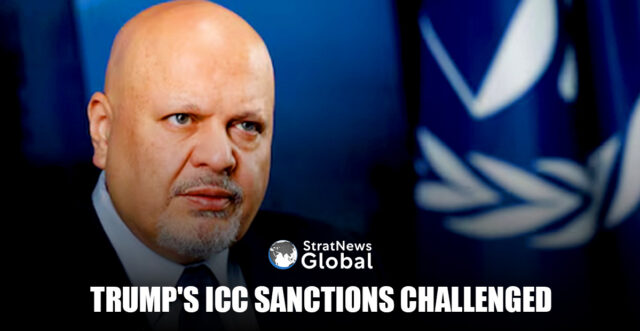Two U.S. human rights advocates, represented by the American Civil Liberties Union (ACLU), on Friday filed a lawsuit challenging President Donald Trump’s sanctions on the chief prosecutor of the International Criminal Court (ICC).
The advocates argue that an executive order Trump signed in February imposing sanctions on ICC Prosecutor Karim Khan and barring U.S. citizens from providing services benefiting him unconstitutionally chills their free speech, in a lawsuit filed in federal court in Bangor, Maine.
Fortify Rights co-founder Matthew Smith and international human rights lawyer Akila Radhakrishnan say the order bars them from speaking with the ICC’s Office of the Prosecutor, including by providing legal advice and evidence, in violation of their rights under the U.S. Constitution’s First Amendment.
The White House and ICC did not immediately respond to requests for comment.
The ICC, which opened in 2002, has international jurisdiction to prosecute genocide, crimes against humanity and war crimes in member states or if a situation is referred by the U.N. Security Council.
Trump’s ICC Sanctions
Trump’s February 6 order authorised potentially far-reaching economic and travel sanctions on people who work on ICC investigations of U.S. citizens or U.S. allies such as Israel, repeating action he took during his first term.
The order specifically imposed sanctions on Khan, who is British. The U.S. Department of the Treasury’s Office of Foreign Assets Control added him to a registry of sanctioned individuals and entities days later.
Trump’s order also said that U.S. citizens who provide services for the benefit of Khan or other sanctioned individuals could face civil and criminal penalties.
The ICC and dozens of countries have condemned the sanctions, pledging to stand by its staff and “continue providing justice and hope to millions of innocent victims of atrocities across the world, in all situations before it.
In Friday’s lawsuit, Smith and Radhakrishnan said they had been forced as a result of Trump’s order to cease human rights work involving the ICC’s Office of the Prosecutor in which they had been seeking justice for victims of atrocities.
Smith, who lives in Maine, said he had previously provided the office evidence of atrocities against the Rohingya, a minority Muslim group in Myanmar. Radhakrishnan said she has advised the office on investigating gender-based violence committed against Afghan women under the Taliban.
“This executive order doesn’t just disrupt our work—it actively undermines international justice efforts and obstructs the path to accountability for communities facing unthinkable horrors,” Smith said in a statement.
(With inputs from Reuters)





